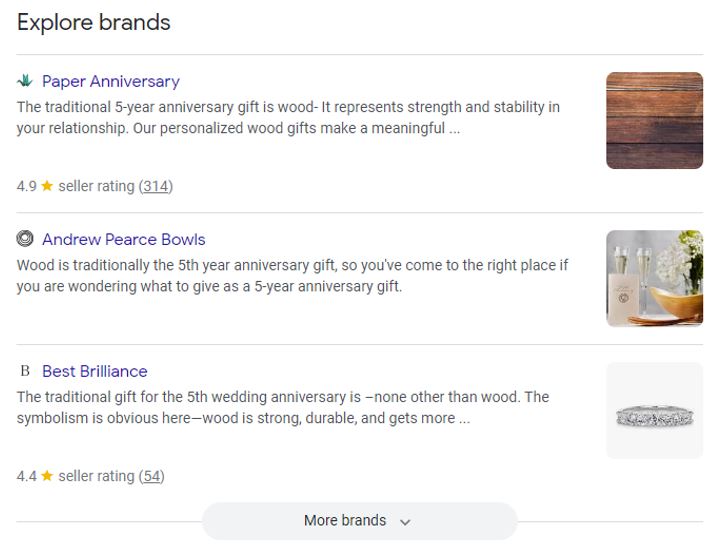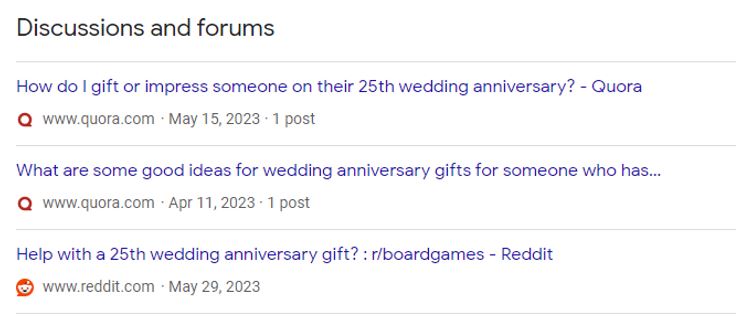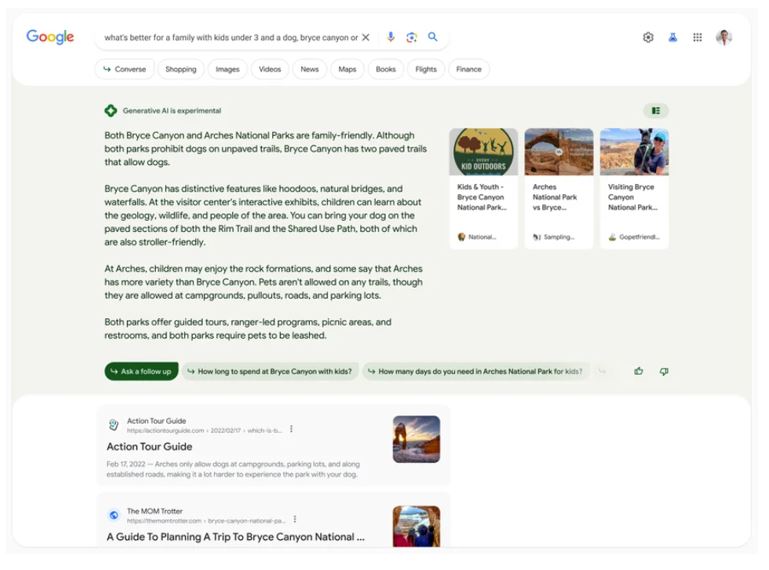SEO Insights: December 2023 Report

Happy New Year! As we start 2024, we are probably leaving behind one of the most disruptive years in search in recent times.
The sudden and very fast adoption of ChatGPT set the cat amongst the pigeons and even yielded the return of the original founders of Google, Larry Page and Sergey Brin, to return to Google and assist with the concerning impact that AI chatbot tools will have on search.
The reality is that the panic was possibly a little premature.
We saw Microsoft’s Bing search engine rapidly release its own AI chatbot in search, Bing Chat. Being a significant investor in OpenAI, the creators of ChatGPT, Microsoft was able to launch their chat tool very quickly. It was basically a version of ChatGPT.
Microsoft truly seemed to believe that this was their moment when they would finally be able to take some significant market share from Google in search.
However, that was far from the case; across the hundreds of websites that we have access to, we haven’t seen any significant increase in traffic from Bing.
Desperately not wanting to be left behind, Google released its own AI chatbot, Bard, although this was very underwhelming as it was perhaps a little too late.
AI chatbots will often make up information, known as hallucinations. Google, having the responsibility of always serving the most useful, accurate and trusted results to its users, could not risk releasing a tool where false information could be created. Therefore, Bard was limited and didn’t seem to be as much “fun” as other, similar, more open tools.
The reality is that Google has been developing and using AI internally for many years, it just wasn’t obvious to users and not so accessible as a chatbot tool. But Google was, and still is, very advanced in this area. It was only a matter of time before the more public effects of this work were realised, and they essentially had their hand forced by the popularity of ChatGPT to accelerate its release and integration into its various services.
Although we are particularly focused on Google’s integration of AI in search, Google has begun integrating Bard into most of its products such as Gmail, Maps, Docs, YouTube, etc. Furthermore, the integration is beginning to look very interesting and more importantly…. quite useful! But that’s something we can discuss at a later point.
In 2023 we also said goodbye to Google Analytics and begrudgingly welcomed GA4. The less said about this the better! Google also shut down Optimize, which was a very useful tool for running conversion experiments, and one which will most definitely be missed.
Search in 2024
As we now look ahead to what Google search will look like in 2024, we can see that there is going to be a plethora of change. Let’s look at the main areas of focus and how we see these things evolving over the course of the year.
AI content generation
Although AI content generation tools are not new, they have been around for some time. Their popularity and availability have dramatically increased since the public release of ChatGPT and similar tools (Bing Chat, Bard, Claude, Perplexity, etc.)
This has facilitated the content generation process for websites, businesses, and spammers alike. In 2023, if you wanted to create a website on a subject, you just needed an idea, a domain, some hosting, WordPress, an account with ChatGPT and you could produce hundreds of pages of content very quickly. In addition, tools such as MidJourney meant that you could also make the pages look pretty with some incredible AI generated images.
Writing ability or lack of knowledge has no longer become a barrier to entry to building an income online.
As such, this is a major problem for the main search engines, Google and Bing. It is estimated that there are over 1 million new web pages created every day, although this figure is likely to be much higher, especially because of the adoption of AI tools to easily generate content (and, more specifically, spam content).
Search engines have their limits, and they can’t index everything. It is estimated that Google potentially indexes approximately 4% of all the documents that it discovers. If you break it down, this isn’t very much at all.
The majority of pages that Google doesn’t index are potentially classed as spam, others may be duplicates, low value pages, etc.
AI tools have APIs, and you can connect those APIs to your website to generate content at scale. You can create hundreds or even thousands of pages in no time.
This undoubtedly poses a real challenge for legitimate websites that are creating useful and original content, following best practices by writing meaningful content and not producing pages ad infinitum. How do you stand out? How do you ensure that you are part of the 4%?
Truthfully, this is going to become increasingly difficult. However, what we’ve seen so far gives us some valuable insight into where the landscape is heading.
There were several major Google updates in 2023, from several Core updates to very impactful updates such as the Helpful Content Update. These updates were more negative towards websites that exclusively promote third-party content, as opposed to actual business websites. Google has always tried to reflect the real world, which is why major brands always rank well. They are generally more trusted, and users recognise them.
Google has been pushing brands in the search results much more in 2023, often displaying “Explore brands”. This is particularly common in US search results, for example:

Additionally, Google is now including user generated content, such as forum discussions, in the search results too:

Google has also started testing – in the US – allowing users to leave comments on the search results themselves. This, in theory, is to help other users if they found specific results useful or not.
We know from recent court documents that Google uses search results interaction data to rank web pages for each search query, and this is likely to only become even more important going forward.
Combining all these elements together, what we are seeing is that businesses need to focus on being seen as a legitimate business. That may sound obvious but if a business (brand) generates unique content, it’s more likely to be trusted than a website that’s purely content focused.
For businesses it’s going to be about reviews, creating trust, and clearly defining and attributing the people behind the website to the content. Expertise and experience are both factors worth bearing in mind. Photos of the business premises, the people, the products and services, the equipment, the social profiles and industry associations or recognitions, all help to increase brand signals.
If there is an opportunity for users to interact with a business website, leaving comments, starting discussions, sharing photos, etc, all of this will be invaluable too.
Ecommerce websites are at an advantage more than ever now. Many search results are becoming flooded with products, as Google aims to take on Amazon. A focus on product performance in search is going to be key in 2024.
AI integration in search results
Although mostly restricted to the US currently, Google has been experimenting with including an AI generated result at the top of the search results.

This is a very intrusive (and worrying) direction that Google is taking as it pushes the organic search results much further down.
It has been experimenting with its setup and implementation over the last few months and these will continue to evolve, but at the moment it’s a Google Labs product and not enabled by default.
However, while not imminent, it’s likely that this will, in some form or another, form part of the search results for everyone in 2024.
Optimising websites to be featured in this area of search results will likely be very tricky, as it’s set to become completely AI generated. However, it’s unlikely to be rolled out in its current form as Google still must ensure that its ads are very prominent on the page. With the generative AI setup that they are currently testing, Google would likely lose a lot of revenue, so this will have to change.
The integration of generative AI in search is a current area of our R&D focus so we’ll discuss this in more detail over the coming weeks.
Helpful content
Whenever we create content for our clients’ websites, or work with them in this area, our focus is always on ensuring that the content is useful, helpful, and relevant.
With the significant Helpful Content Update released in 2023, ensuring that content is “great” is more important than ever. But what makes content great?
This doesn’t have a “one size fits all” answer. It really depends on the subject, the audience and the intent behind the search terms being targeted.
For example, an Ecommerce website in the fashion industry would focus on creating content about the latest trends, popular products, and styles, etc. This would likely be very visual content, mainly images and possibly videos.
However, for a website that’s focused on psychotherapy, it will need very well-written, informative content that covers a topic in detail but also backed up by authors that are experts in their field. Maybe as a differentiator to the competition, a more in-depth video could work well and maybe even taking questions from users and using them to compile a Q&A type response could work well.
The idea is to be specific and helpful to your audience.
Engagement
On a final note, we need to discuss engagement. It’s important that when users land on your website, that they have found what they are looking for. Ideally, they are not going to click the Back button and go back to the search results (that shows a poor result) and they will spend some time on the website, interacting with it and hopefully taking action, such as buying something or submitting an enquiry.
We used to look at bounce rates as a guide to engagement (as well as time on page, pages per visit, etc.) but there’s more to it than that now. What’s necessary is to ensure that the page appearing in the search results looks enticing (to get the click) and then study the behaviour of users on the page when they finally arrive on the website to fully understand what they are finding useful.
Google rewards websites when users find what they are looking for. It may mean that new content should be created that is specific to a search query, or the content should be created in a way that makes it easier to consume, such as with a short video.
Understanding the behaviour of users is not page specific, but rather, query specific. Every search query is different and understanding how users interact with the search results and the page for each query is vital.
A good example of this in action is YouTube. A video can go viral if it appears to be popular and if users are engaged (demonstrated by a metric like high watch time). If prudent, YouTube will recommend it to more people, increasing views and further expanding its reach.
Google is no different. YouTube is also a search engine so the behaviours are inherently the same. Google rewards great content that users love, much like YouTube does. But when trying to rank on Google, it’s not as simple as just creating a great piece of content; it won’t just rank by itself. It will need some help in the form of user-friendly pages and high-quality links to bolster its visibility. Collectively, these are still significant ranking factors to help content appear more popular on the web, and these will still prove essential in 2024.
So, 2024 is shaping up to be a very interesting year and we will definitely see some more major changes in the search results.
At Artemis we invest heavily in R&D to ensure that our clients are always at the forefront of the latest methodologies and technologies to succeed in search, and in 2024 we will be dedicating more resources and time than ever.
We wish you and your business a very prosperous 2024!

